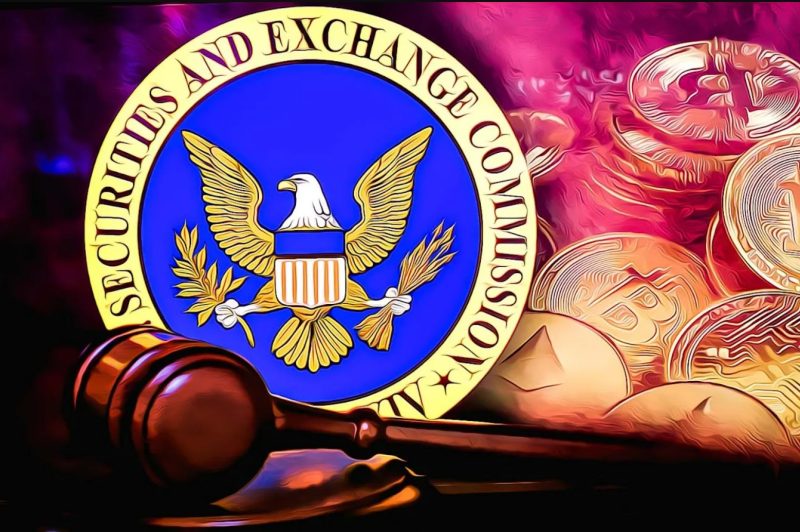As the crypto industry witnesses rapid growth, regulatory challenges arise in tandem. David Hirsch, who heads the SEC’s Crypto Assets and Cyber Unit, raises alarm bells for the crypto sector, emphasizing that and DeFi projects perceived to be violating securities laws.
With major platforms like and already under scrutiny, the crypto industry is now on high alert. But given the immense growth of the crypto space and the limited resources at the SEC’s disposal, where does the line get drawn?
, a seasoned crypto expert, is here to delve deeper into these regulatory challenges and their implications for the future of crypto.
As an entrepreneur, investor, and the mind behind “”, Brandon lends a nuanced perspective on the SEC’s stance and its ripple effects on crypto’s horizon.
David Hirsch’s Stern Warning
The SEC’s Crypto Enforcement Chief, David Hirsch, has sounded the alarm about potential violations of securities laws by various exchanges and DeFi projects, echoing concerns similar to those associated with giants like Coinbase and Binance.
Question: Given the breadth of David Hirsch’s statements, how critical do you see the current regulatory situation for crypto exchanges and DeFi projects?
Response: If we are using the SEC as a benchmark for what we’d consider the regulatory situation, then I’d say Crypto as an industry is relatively fine. It’s more of a hurdle than it is a barrier.
I don’t imagine Gary Gensler being the Chair of the SEC much longer and Congress is inching closer towards passing legislation that would clear up this whole mess.
The Big Players – Coinbase and Binance
and Binance, two leading figures in the crypto space, seem to be at the epicenter of the SEC’s scrutiny.
Question: What, in your perspective, differentiates the likes of Coinbase and Binance from other exchanges and DeFi platforms in the eyes of the SEC?
Response: The size of their war chests. Coinbase and Binance both have a lot of capital at their disposal and deep-rooted connections with politicians to lobby on their behalf. That’s why the under-funded SEC is likely to fail in their lawsuits versus both of the exchanges.
Other exchanges and platforms, unfortunately, don’t have the same resources. So they are reduced to options like paying or . That’s the reality.
The Evolution Under Regulatory Pressure
Regulatory pressures can have profound effects on the trajectory of industries. For that champion decentralization, the future might seem uncertain.
Question: How might these regulatory pressures influence the evolution of DeFi projects, especially those wanting to remain decentralized?
Response: It’s better to have a fairly regulated environment than to continue having the wild west of Crypto. We’ve seen way too many scams, ponzis and fraudsters in the past 2 years alone. It’s in our industry’s best interest to have that cleaned up so we can have a healthy market and developer ecosystem.
On the flip side, many adamant believers of true decentralization will just innovate around the problem. You can’t really stop decentralized architecture. It’s decentralized for a reason.
So instead of isolating DeFi projects and calling them bad, it’s better to encourage them and compromise. That’s an area where the regulatory pressure must change.
Navigating The SEC’s Focus on DeFi
Despite the inherently decentralized ethos of DeFi, Hirsch’s statement clarifies that merely adding a ‘DeFi’ label won’t exempt projects from regulatory oversight.
Question: Hirsch emphasizes that adding the DeFi label won’t deter the SEC from its enforcement actions. What precautions should DeFi projects adopt to ensure they’re on the right side of the law?
Response: Honestly, I don’t think the SEC truly understands what DeFi means. If they did, they’d be all for it. But this is what DeFi projects need to do.
Stop trying to be anonymous. Don’t intentionally try to disrupt the financial system with Tokenized securities or unregistered offerings, and then hide. Instead they should operate within the parameters of their legal jurisdiction. Look for sandboxes, pilot programs, government contracts, there are plenty of options.Work with government agencies like the SEC to the best of your ability. If it’s impossible to do so, then find a better jurisdiction. There are plenty of them all over the world. Hong Kong, Singapore, Switzerland, UAE, etc.
Facing An Aggressive SEC
With the SEC intensifying its focus, the implications for and DeFi projects could be long-reaching.
Question: What are the potential long-term implications for exchanges and DeFi projects should the SEC continue its aggressive stance?
Response: The negative outcome would be an unfavorable environment in the United States where developers don’t want to work, banks are hesitant, VC firms won’t invest and the best companies leave the United States.
The positive outcome is the SEC continues to be held in check by the Courts (e.g. Ripple v. SEC, Grayscale v. SEC) and the Securities and Exchange Commission gets reformed by Congress to better reflect the digital age we live in. However, DeFi will continue to develop in any direction it desires (good or bad) and scams will continue to plague the industry.
The Legal Frontlines
The crypto industry’s willingness to engage in legal battles instead of settling might signify its maturity and resilience.
Question: With crypto platforms potentially taking the agency to court rather than settling, how do you see these legal battles shaping the crypto industry’s future?
Response: A real industry stands up for itself, even when it finds itself battling the government. The galvanization of Crypto to fight back is a great sign of an industry that is maturing. As a result, many will find themselves on the right side of their legal disputes, especially those with the resources to contend.
How do I know this? Because the largest asset managers in the world (, Vanguard, Statestreet, Fidelity) can see it as well and they are investing heavily into this space, filing for , buying ownership in mining operations, buying Bitcoin, buying Patents and IP. There is a turning point coming in the next year.
A Word of Advice
Amidst regulatory battles and industry shake-ups, stakeholders in the crypto world are in dire need of guidance.
Question: Lastly, with the SEC’s enforcement actions in play, what advice would you offer investors, developers, and other stakeholders in the crypto space?
Keep building and developing. Stop worrying about how much money you can make, what is going to pump, which NFT to flip, where we are in the Bitcoin cycle.
Those things will always exist. What matters is what we build with the amazing technology this industry has furnished over the years. Focus on solving problems, helping people and fixing our world. The rest will follow on its own.
Summing Up
David Hirsch, leading the SEC’s Crypto Assets and Cyber Unit, indicates a heightened focus on crypto exchanges and DeFi projects suspected of securities law violations.
While established entities like find themselves in the SEC’s crosshairs, the agency aims to cast a broader regulatory net.
Amidst this evolving landscape, Brandon Zemp provides invaluable insights, underscoring the industry’s resilience and potential.






